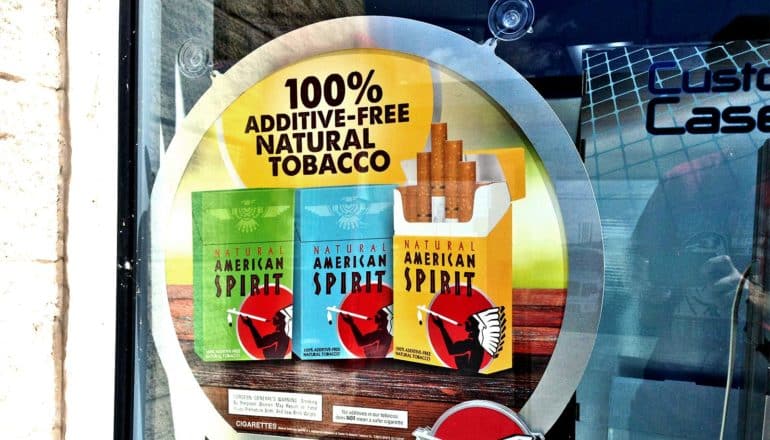
People perceive cigarettes marketed as being environmentally friendly as less harmful to health and the environment, a new survey shows.
Few people would consider a handgun with a sustainably harvested wood stock any less lethal than one with a steel stock. But the same logic doesn’t apply to cigarettes—the leading preventable cause of death globally and in the United States.
As reported in Preventive Medicine, the survey is the first to gauge the effect of such marketing on cigarette packaging, which the average pack-a-day smoker views about 20 times a day.
“Ecofriendly and natural food products are seen as safer for health,” says lead author Anna Epperson, a postdoctoral fellow with the Stanford University Prevention Research Center. “That couldn’t be further from the truth when it comes to cigarettes.”
On average, smokers die 10 years earlier than nonsmokers, according to the Centers for Disease Control and Prevention. They have a significantly higher risk for cancer, heart disease, stroke, lung diseases, diabetes, and a raft of other maladies.
Every year in the US, cigarette smoking is responsible for more than 480,000 deaths (a number greater than the population of Oakland, California), including more than 41,000 deaths resulting from secondhand smoke exposure.
Further, cigarettes aren’t just a health scourge. They are also the most commonly discarded form of litter in the world, defiling just about every kind of natural landscape and built environment with toxic chemicals that leach into soil and water supplies.
Socially responsible cigarettes?
Researchers compared two major cigarette brands: Pall Mall, marketed as a discount brand, and Natural American Spirit, a super-premium brand that features a pro-environment marketing campaign—the first-ever corporate social responsibility advertising on cigarette packaging.
That campaign includes a description of a manufacturing facility that is “zero-waste-to-landfill” and features a wreath of three tobacco leaves that mimics the symbol for recycling, as well as the logo for the Programme for the Endorsement of Forest Certification, an international organization that promotes sustainable forest management.
The same company, Reynolds American, owns both brands, which have the same effect on health. Still, survey participants—including former smokers, current smokers, and people who had never smoked—consistently ranked Natural American Spirit as less harmful to health and the environment.
The beliefs were strongest among current smokers, a fact that could discourage quitting and might encourage switching to the brand, the researchers say. While never and former adult smokers likely have developed a firmer stance than current smokers on the harms of smoking, many current smokers may seek a product alternative that reduces smoking harms to both humans and the planet, the researchers explain.
Prohibit ‘natural’
In 2006, a federal court concluded that the tobacco industry had deceived the American public for more than 50 years about the harms of smoking and secondhand smoke and suggested banning the word “natural” from cigarette marketing and brand names.
“Our findings reinforce the court’s conclusion that positioning cigarettes as ‘natural’ deceives the American public of the harms of smoking,” says senior author Judith Prochaska, an associate professor in the medicine department at the Prevention Research Center.
Aggregating pro-environment and health-related claims is nothing new in marketing. While it may be justified for organic agriculture products, for example, it is not a generally valid principle, according to coauthor Eric Lambin, a professor of earth system science.
“Marketing language that obscures these health harms, even indirectly through questionable pro-environment claims, ought to be prohibited.”
“People need to be made aware of the risk of being manipulated by big brands that appeal to the environmental values of consumers to sell them products that are bad for their health.”
In an earlier, related study, the researchers found that the Natural American Spirit pack design, which also features icons of an American Indian smoking a pipe and a mythological thunderbird, creates misperceptions that American Indians own or grow the tobacco on tribal land making it in turn, healthier and more desirable.
The researchers suggest regulations to prohibit using the word “natural” in tobacco brand names or using pro-environment language and imagery on cigarette packs. Instead, they propose mandating plain packaging for cigarettes.
“All commercially available cigarettes in the US are designed to create and sustain addiction and will kill half of all long-term users if smoked as intended,” the researchers write. “Marketing language that obscures these health harms, even indirectly through questionable pro-environment claims, ought to be prohibited.”
Additional coauthors are from Stanford and the Université Catholique de Louvain in Belgium.
Source: Stanford University
The post Nope, ‘environmentally friendly’ cigarettes aren’t healthy appeared first on Futurity.
from Futurity https://ift.tt/2KuPGNJ
No comments:
Post a Comment